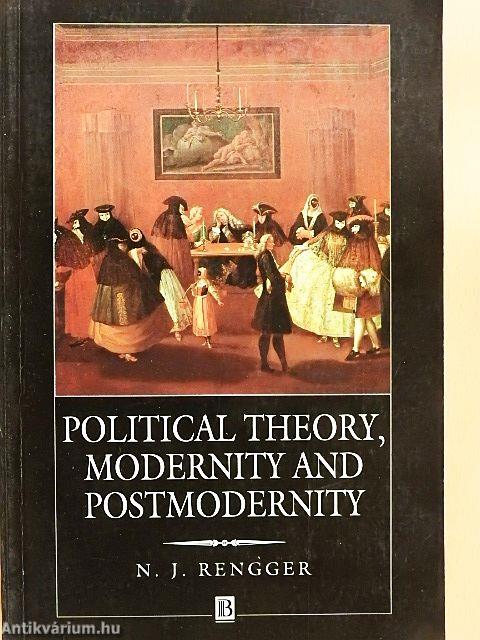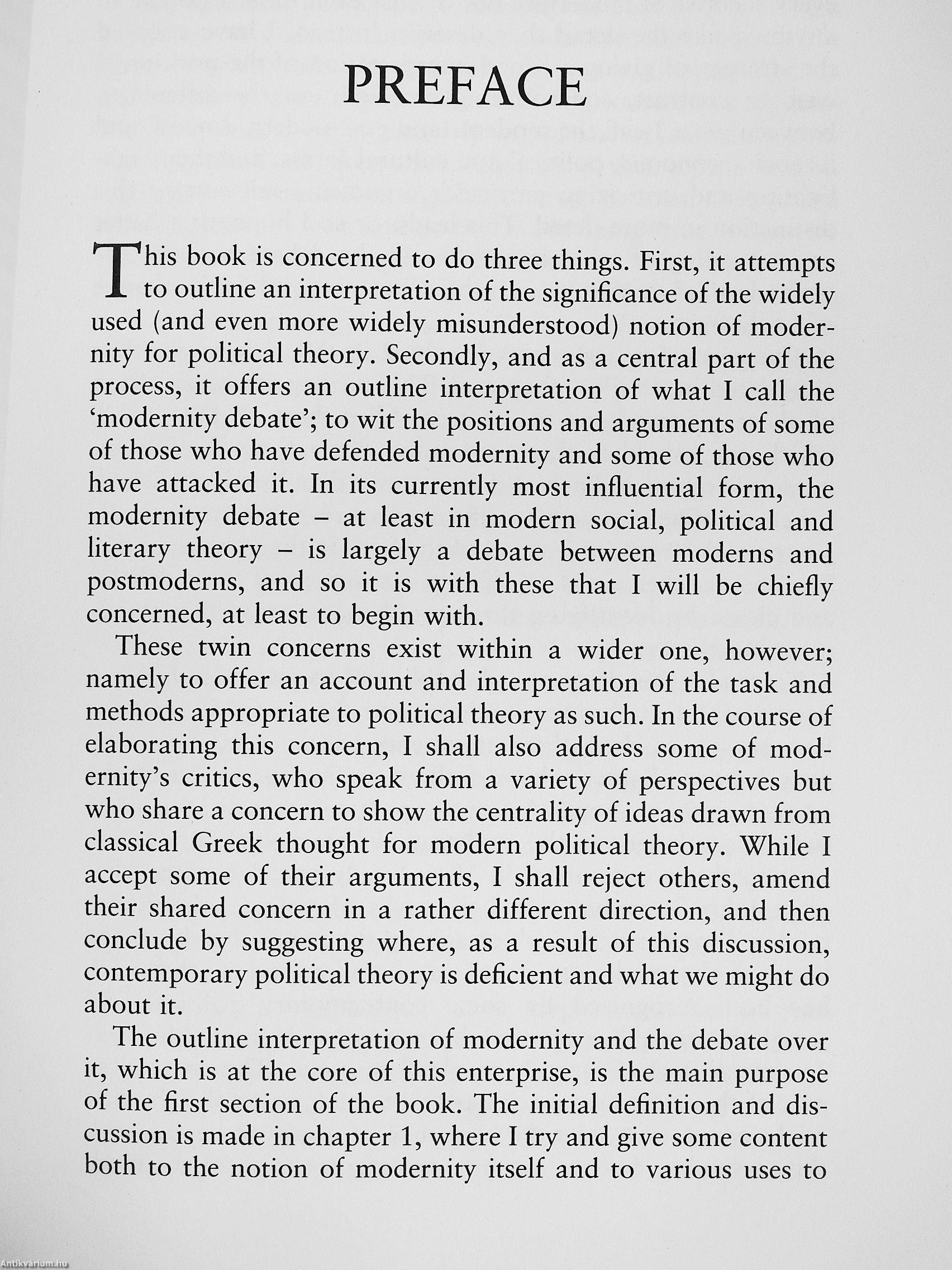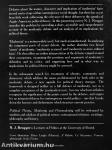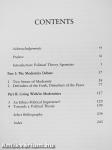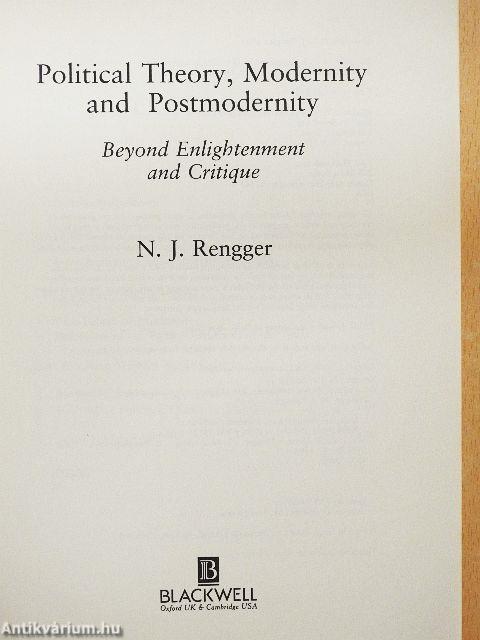1.103.822
kiadvánnyal nyújtjuk Magyarország legnagyobb antikvár könyv-kínálatát

VISSZA
A TETEJÉRE
JAVASLATOKÉszre-
vételek
Political Theory, Modernity and Postmodernity
Beyond Enlightenment and Critique
| Kiadó: | Basil Blackwell |
|---|---|
| Kiadás helye: | Oxford |
| Kiadás éve: | |
| Kötés típusa: | Varrott papírkötés |
| Oldalszám: | 253 oldal |
| Sorozatcím: | |
| Kötetszám: | |
| Nyelv: | Angol |
| Méret: | 23 cm x 15 cm |
| ISBN: | 0-631-19159-3 |
naponta értesítjük a beérkező friss
kiadványokról
naponta értesítjük a beérkező friss
kiadványokról
Előszó
TovábbFülszöveg
Debates about the nature, character and imphcation of 'modernity' have moved centre stage within contemporary social thought, but there has as yet been little work addressing the relevance of these debates to the agenda of Anglo-American political theory. In this pioneering survey N.J. Rengger remedies this problem by providing a short, accessible and comprehensive account of the modernity debate and an analysis of its implications for political theory.
'Modernity' is a notion widely used, but much misunderstood. In analysing the component parts of recent debate, the author identifies two broad 'senses' of modernity: 'modernity as mood' and 'modernity as socio-cultural form'. He then offers an outline interpretation of the debates ranged around these conceptions, examining the positions and arguments of modernity's defenders and its critics, and suggesting how and in what way its implications for political theory might be assessed.
In the subsequent search for treatments of... Tovább
Fülszöveg
Debates about the nature, character and imphcation of 'modernity' have moved centre stage within contemporary social thought, but there has as yet been little work addressing the relevance of these debates to the agenda of Anglo-American political theory. In this pioneering survey N.J. Rengger remedies this problem by providing a short, accessible and comprehensive account of the modernity debate and an analysis of its implications for political theory.
'Modernity' is a notion widely used, but much misunderstood. In analysing the component parts of recent debate, the author identifies two broad 'senses' of modernity: 'modernity as mood' and 'modernity as socio-cultural form'. He then offers an outline interpretation of the debates ranged around these conceptions, examining the positions and arguments of modernity's defenders and its critics, and suggesting how and in what way its implications for political theory might be assessed.
In the subsequent search for treatments of identity, community and democracy which address the issues problematized by both sides in the modernity debate, a new agenda for political theory emerges. The framework is designed neither as a full defence of modernity, nor as a complete acceptance of the 'postmodern turn', but one which nevertheless recognizes the significance of the points raised by the debates, and argues for an integrated theory for contemporary world politics - one that breaks down the barriers and dichotomies which structure current practice.
Political Theory, Modernity and Postmodernity will be welcomed by students and scholars of political science, international relations, sociology, philosophy and history.
N. J. Rengger is Lecturer in Politics at the University of Bristol.
Cover illustration; Pietro Longhi (Maniera), II Ridotio, Ca Rezzonico, Venezia, photograph: Scala, Firenze.
Cover design by Richard Boxall Design Associates Vissza
Témakörök
- Filozófia > Témaköre szerint > Filozófiatörténet > Tanulmányok
- Idegennyelv > Idegennyelvű könyvek > Angol > Filozófia > Témaköre szerint > Filozófiatörténet > Tanulmányok
- Idegennyelv > Idegennyelvű könyvek > Angol > Történelem > Egyéb
- Filozófia > Témaköre szerint > Tanulmányok, esszék
- Filozófia > Témaköre szerint > Szakfilozófiák
- Filozófia > Témaköre szerint > Filozófiatörténet > Irányzatok
- Idegennyelv > Idegennyelvű könyvek > Angol > Filozófia > Témaköre szerint > Tanulmányok, esszék
- Idegennyelv > Idegennyelvű könyvek > Angol > Filozófia > Témaköre szerint > Szakfilozófiák
- Idegennyelv > Idegennyelvű könyvek > Angol > Filozófia > Témaköre szerint > Filozófiatörténet > Irányzatok
- Történelem > Idegennyelvű > Angol
- Filozófia > Témaköre szerint > Társadalomfilozófia > Egyéb
- Idegennyelv > Idegennyelvű könyvek > Angol > Filozófia > Témaköre szerint > Társadalomfilozófia > Egyéb
- Történelem > Politika > Politológia



